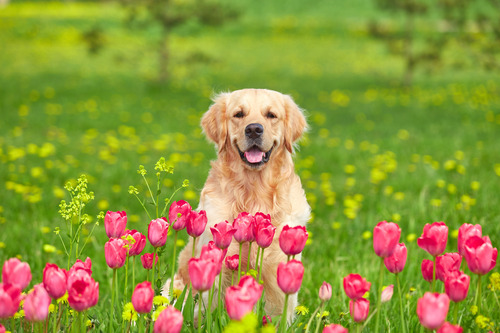7 Poisonous Plants for Dogs: Plants To Keep Your Dog Away From

Dogs are naturally curious creatures, often sniffing, chewing, and even ingesting plants in their environment. While some greenery is harmless, others can be highly toxic and pose serious health risks. Many common household and garden plants contain substances that can cause vomiting, diarrhea, organ failure, or even fatal poisoning in dogs. When you’re aware of which plants are dangerous, you can help protect your furry companion from accidental ingestion. In this blog, we will explore seven poisonous plants for dogs, their potential effects, and how to prevent exposure. If you suspect your dog has ingested a toxic plant, contact Happy Tails Emergency Veterinary Clinic in Greensboro, North Carolina, at (336) 288-2688 immediately.
1. Sago Palm
The sago palm is a popular decorative plant found in homes and yards, but it is highly toxic to dogs. Every part of the plant, including the seeds, leaves, and roots, contains cycasin, a toxin that can cause severe liver damage. Ingestion of even a small amount can lead to symptoms such as vomiting, diarrhea, lethargy, and jaundice. In severe cases, dogs may experience seizures or liver failure, which can be fatal without immediate veterinary intervention. Because of its high toxicity, pet owners should avoid keeping sago palms in their homes or gardens. If your dog comes into contact with this plant, seek emergency veterinary care right away.
2. Oleander
Oleander is a beautiful flowering shrub commonly found in gardens and public spaces, but it is one of the most poisonous plants for dogs. This plant contains cardiac glycosides, which can interfere with heart function, leading to irregular heartbeats, vomiting, drooling, and lethargy. In severe cases, ingestion of oleander can cause heart failure and sudden death. Even dried leaves retain their toxicity, making them dangerous if they fall to the ground where a dog might pick them up. If you have oleander in your yard, consider replacing it with a pet-safe alternative to eliminate the risk.
3. Azaleas and Rhododendrons
Azaleas and rhododendrons are popular ornamental plants, but they contain grayanotoxins, which can be extremely harmful to dogs. Symptoms of azalea poisoning include drooling, vomiting, diarrhea, and difficulty walking. In more severe cases, dogs may experience low blood pressure, abnormal heart rhythms, and even coma. Even a small nibble of this plant can lead to significant health issues, so it is best to keep dogs away from gardens where azaleas and rhododendrons are present. If you suspect your dog has ingested any part of these plants, contact a veterinarian immediately.
4. Autumn Crocus
The autumn crocus is a vibrant and attractive flower, but it contains colchicine, a toxin that can cause severe health complications in dogs. Ingestion can lead to vomiting, bloody diarrhea, kidney and liver damage, and respiratory failure. Symptoms may not appear immediately, which can make diagnosing poisoning difficult. Because of the delayed onset of symptoms, dog owners should be particularly cautious with this plant. If you notice any unusual behavior in your pet after potential exposure, seek veterinary attention without delay.
5. Tulips and Daffodils
Many pet owners love planting tulips and daffodils in their gardens, but these flowers can be toxic to dogs. The most dangerous part of these plants is the bulb, which contains alkaloids that can cause serious gastrointestinal distress. Dogs that ingest tulip or daffodil bulbs may experience vomiting, excessive drooling, and difficulty breathing. In severe cases, the toxins can lead to heart problems and organ failure. Since dogs often dig in gardens, it is essential to prevent access to areas where these bulbs are planted. If you suspect your dog has eaten any part of these flowers, seek veterinary help immediately.
Preventing Tulip and Daffodil Poisoning
To minimize the risk of poisoning, consider planting these flowers in raised beds or enclosed areas where your dog cannot reach them. Additionally, supervision and training can help deter dogs from digging in garden beds. If you want a pet-safe alternative, opt for non-toxic flowers such as marigolds or sunflowers.
6. Foxglove
Foxglove contains digitalis glycosides, which can severely affect heart function. Symptoms of foxglove poisoning include vomiting, diarrhea, drooling, weakness, and an irregular heartbeat. In severe cases, ingestion can lead to cardiac arrest. Because of its toxicity, foxglove should never be planted in areas accessible to pets. If your dog comes into contact with this plant, immediate veterinary intervention is necessary.
7. Lily of the Valley
Lily of the valley is a delicate and fragrant plant, but it is highly toxic to dogs. Like foxglove, it contains cardiac glycosides that can disrupt heart function. Dogs that ingest this plant may experience vomiting, confusion, a slow heart rate, and seizures. Because lily of the valley spreads easily and grows in many gardens, dog owners should be particularly cautious. Keeping pets away from this plant and removing any fallen leaves or flowers can help prevent accidental ingestion. If poisoning occurs, seek emergency veterinary care immediately.
How to Protect Your Dog from Poisonous Plants
Preventing exposure to poisonous plants for dogs requires awareness and proactive measures. Here are some key steps to protect your furry friend:
- Know what’s in your yard: Identify all plants in your home and garden to determine if any pose a risk to your pet.
- Remove toxic plants: If possible, eliminate any poisonous plants from your property and replace them with pet-friendly alternatives.
- Supervise outdoor activities: Monitor your dog when they are in unfamiliar outdoor spaces, such as parks or walking trails, where toxic plants may be present.
- Use barriers: Fencing off garden areas or using raised planters can help keep dogs away from harmful plants.
- Train your dog: Teaching commands like “leave it” can prevent your dog from eating unknown plants during walks or playtime.
- Know the signs of poisoning: Familiarize yourself with the symptoms of plant poisoning and act quickly if you notice any concerning signs.
If you suspect your dog has ingested a toxic plant, do not wait for symptoms to worsen. Call Happy Tails Emergency Veterinary Clinic in Greensboro, North Carolina, at (336) 288-2688 for immediate assistance.
Recent Posts
About Us
At Happy Tails Veterinary Emergency Clinic in Greensboro, NC, our kind and knowledgeable team is available to provide gold standard emergency vet care for you and your pet. We’re available in the late night and early morning hours during the week, and 24/7 on weekends for your convenience.
